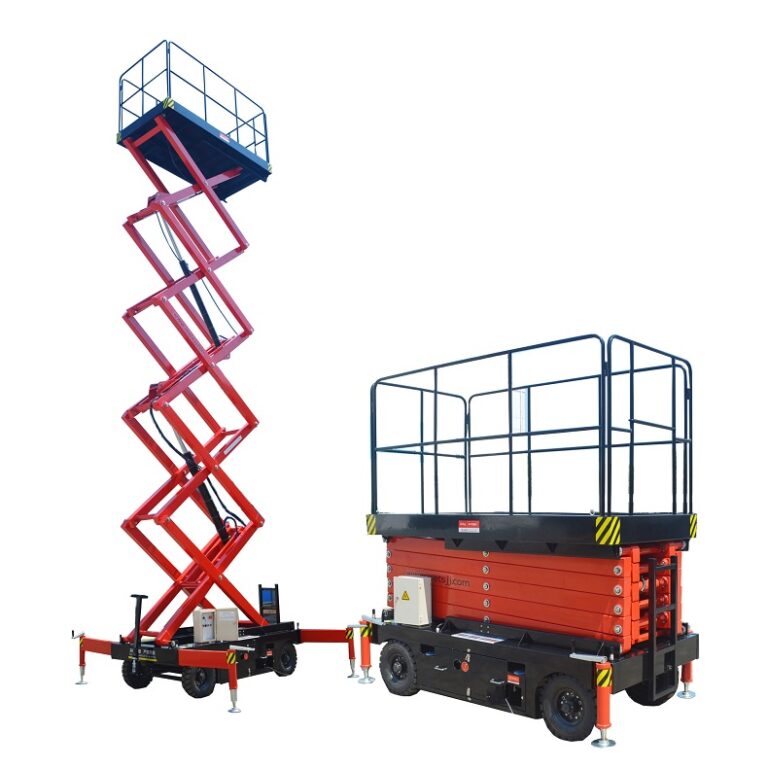Aerial Platforms in Construction: Enhancing Productivity and Safety from buzai232's blog
In the dynamic world of construction, efficiency and safety are paramount. Aerial platforms, also known as aerial work platforms (AWPs) or elevated work platforms, have revolutionized the way tasks at height are accomplished. These versatile machines provide a safe and stable platform for various tasks, from building maintenance to installation of fixtures. In this article, we will explore how aerial platforms enhance productivity and safety in the construction industry.
The Role of Aerial Platforms
Aerial platforms are mechanical devices used to elevate workers, tools, and materials to perform tasks at height. They come in various forms, each designed to suit specific applications and environments. Whether it's reaching towering heights on a construction site or conducting maintenance tasks in a warehouse, aerial platforms provide a safe and stable means of access.
 forklifts scissor aerial platform | China Trade price on Manufacturer Wholesale scissor aerial platform Materials Handling Platforms sale Buy Online Industrial Equipment
forklifts scissor aerial platform | China Trade price on Manufacturer Wholesale scissor aerial platform Materials Handling Platforms sale Buy Online Industrial Equipment
Enhancing Productivity
One of the primary benefits of aerial platforms is their ability to enhance productivity. Traditional methods of working at height, such as ladders and scaffolding, can be time-consuming and labor-intensive. Aerial platforms, on the other hand, allow workers to reach elevated areas quickly and efficiently. This not only saves time but also reduces the physical strain on workers, enabling them to perform tasks more effectively.
Moreover, aerial platforms are equipped with features that further boost productivity. For instance, boom lifts, also known as cherry pickers, have an extendable arm that provides both vertical and horizontal reach. This flexibility allows workers to access difficult-to-reach areas without the need for repositioning the platform frequently. Scissor lifts, with their crisscrossing mechanism, provide stable elevation and are ideal for tasks that require a straight vertical lift.
Improving Safety
Safety is a critical concern in the construction industry, and aerial platforms play a vital role in mitigating risks associated with working at height. These platforms are designed with safety features such as guardrails, harness attachment points, and non-slip surfaces. By providing a stable and secure platform, aerial platforms significantly reduce the risk of falls and accidents.
Additionally, modern aerial platforms are equipped with advanced safety technologies. Proximity sensors and automated navigation systems enhance the operator's awareness and control, minimizing the chances of collisions and other accidents. Regular maintenance and inspections of aerial platforms further ensure their safe operation, contributing to a safer work environment.
Versatility in Construction
Aerial platforms are indispensable in various construction tasks. From installing electrical fixtures to painting building exteriors, these platforms offer a versatile solution for a wide range of applications. Their ability to navigate through tight spaces and reach elevated areas makes them ideal for both indoor and outdoor projects.
In addition to construction, aerial platforms are also used in other industries such as maintenance, warehousing, and telecommunications. Their adaptability and efficiency make them a valuable asset in any setting that requires working at height.
Environmental Considerations
As the construction industry becomes increasingly conscious of its environmental impact, the use of electric aerial platforms is gaining popularity. Electric aerial platforms produce zero emissions, making them a greener alternative to their internal combustion counterparts1. They also operate more quietly, reducing noise pollution on construction sites and creating a more pleasant work environment for employees.
Conclusion
In conclusion, aerial platforms have become essential tools in the construction industry, enhancing both productivity and safety. Their versatility, advanced features, and environmental benefits make them a valuable asset for any construction project. By embracing the use of aerial platforms, construction companies can achieve higher efficiency, reduce risks, and contribute to a more sustainable future.
Post
| By | buzai232 |
| Added | Sep 12 '24, 06:37PM |
Rate
Archives
- All
- December 2017
- November 2017
- October 2017
- September 2017
- June 2017
- May 2017
- December 2018
- November 2018
- October 2018
- September 2018
- August 2018
- July 2018
- June 2018
- May 2018
- April 2018
- March 2018
- January 2018
- December 2019
- November 2019
- October 2019
- September 2019
- August 2019
- July 2019
- June 2019
- May 2019
- April 2019
- March 2019
- January 2019
- December 2020
- November 2020
- October 2020
- September 2020
- August 2020
- July 2020
- June 2020
- May 2020
- April 2020
- March 2020
- January 2020
- December 2021
- November 2021
- October 2021
- September 2021
- August 2021
- July 2021
- June 2021
- May 2021
- April 2021
- March 2021
- February 2021
- January 2021
- December 2022
- November 2022
- October 2022
- September 2022
- August 2022
- July 2022
- June 2022
- May 2022
- April 2022
- March 2022
- February 2022
- January 2022
- December 2023
- November 2023
- October 2023
- September 2023
- August 2023
- July 2023
- June 2023
- May 2023
- April 2023
- March 2023
- February 2023
- January 2023
- December 2024
- November 2024
- October 2024
- September 2024
- April 2024
- September 2025
- August 2025
- July 2025
- June 2025
- May 2025
- April 2025
- March 2025
- February 2025
- January 2025
The Wall